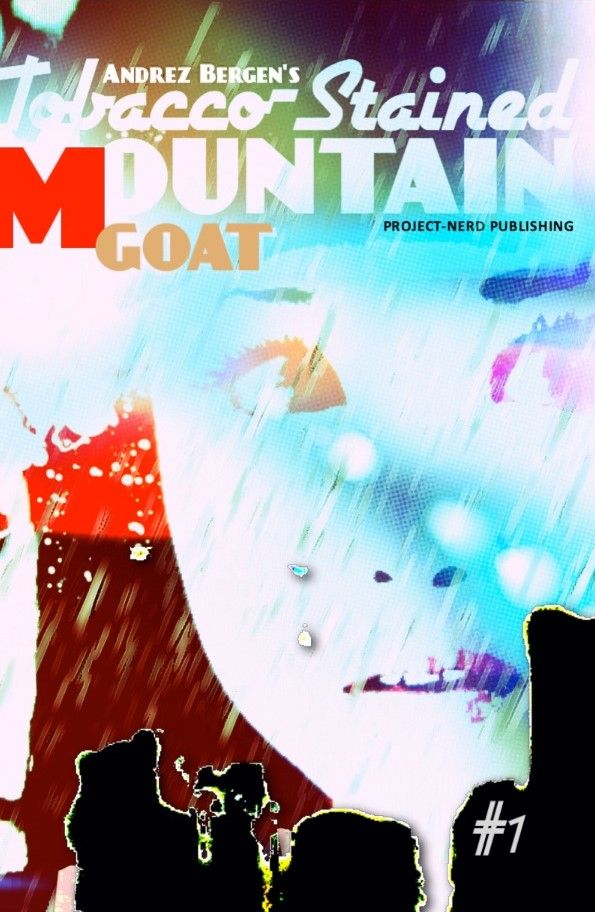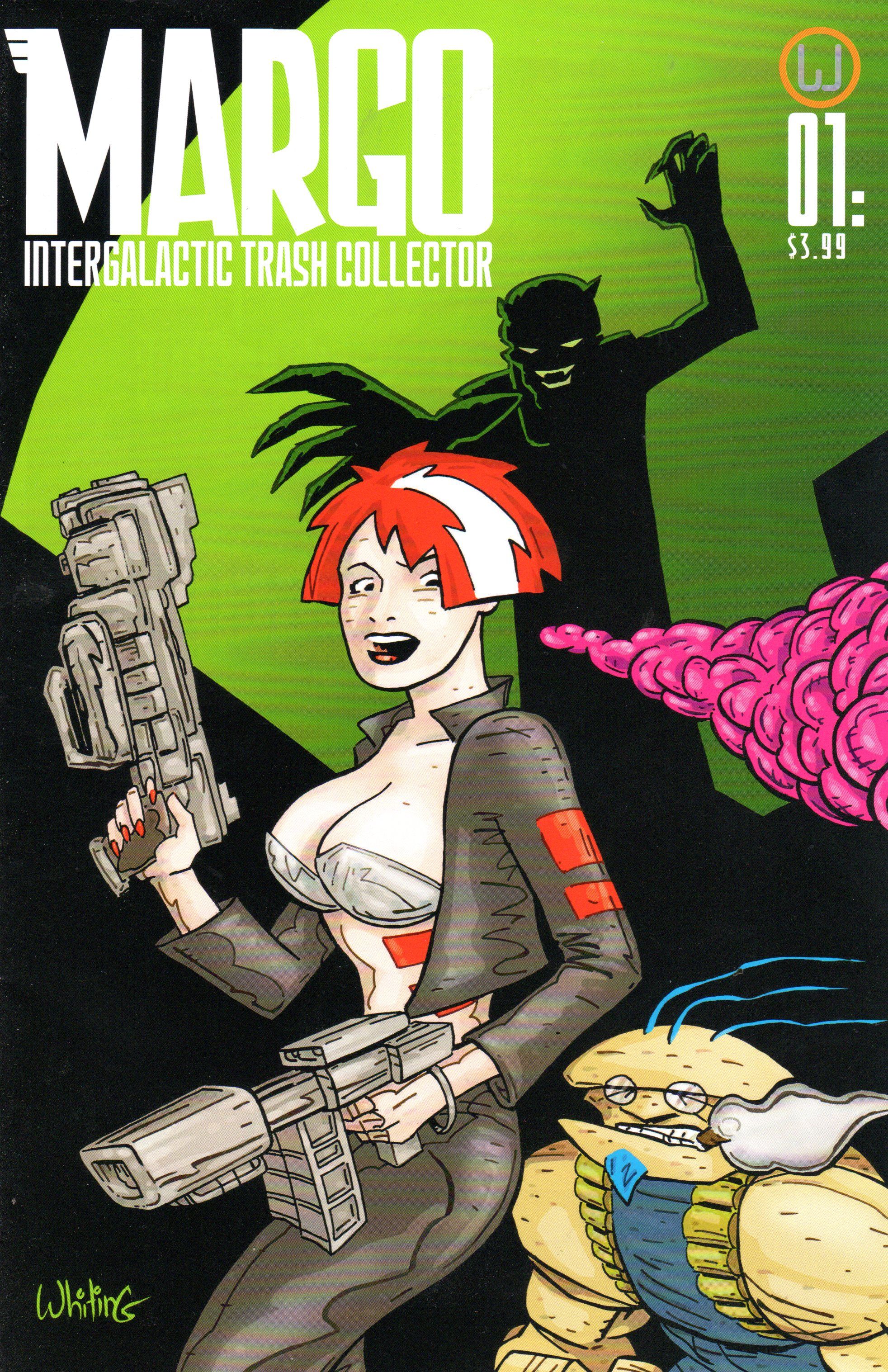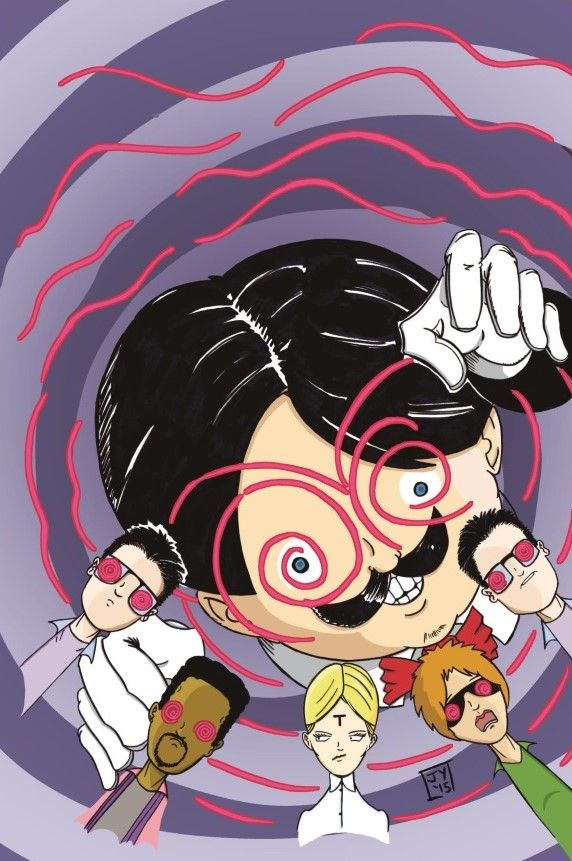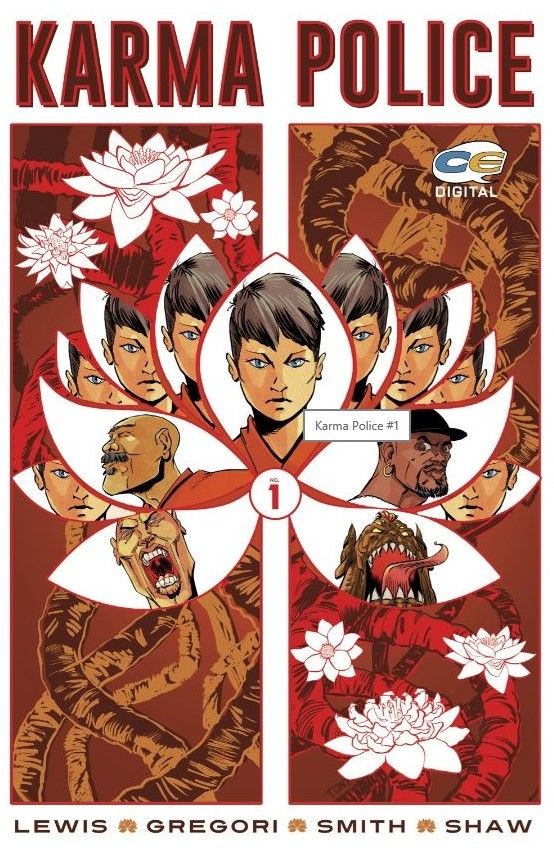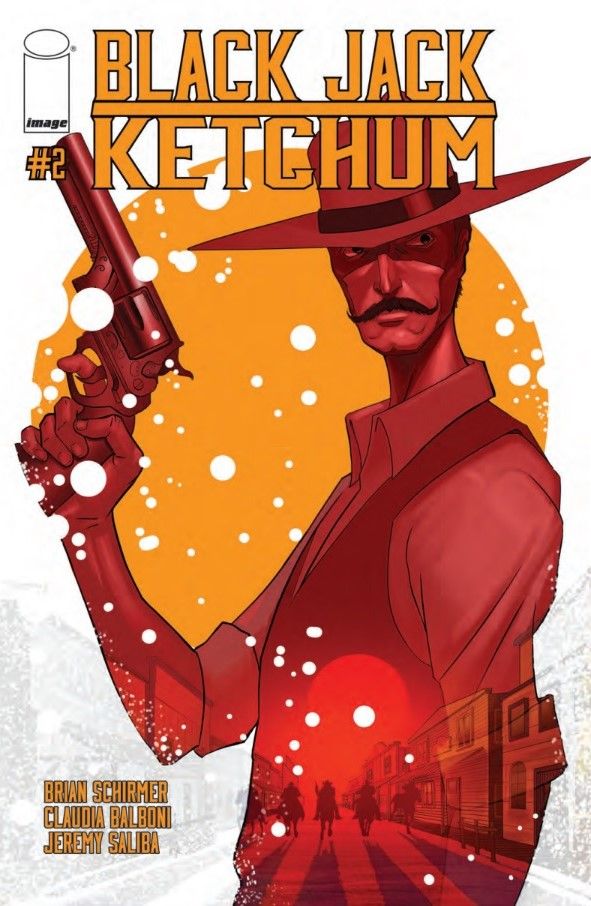I've been meaning to review these for quite some time, so I better get on it, oughtn't I?
Margo: Intergalactic Trash Collector #1 ("The Hand of Glom") by Jim Whiting (writer/artist). $3.99, 21 pgs, FC, self-published.
Jim Whiting sent this issue to me a while ago, and I feel bad for not reading it earlier, but time just keeps slipping away from me. It has that DIY charm that is so present in so many self-published books and which I have a soft spot for, as Whiting produced everything in this. He introduces Margo, an intergalactic trash collector (funny how that works out), and launches her on an adventure. The biggest problem with the book is that Margo doesn't actually do enough trash collecting. The first few pages show her disposing of trash in a star (which is a good way to dispose of it, I suppose - we should shoot all the trash in the world into our sun!), but then she puts in for "shore leave" - she heads to the nearest planet to drink alcohol. That's where the plot really kicks in.
I know it's a weird thing to want - more trash collecting! - but the idea of an intergalactic trash collector is not a bad one, and while the stakes might not be too high in stories involving them, they could easily get caught in something exciting while on the job (who knows what intergalactic people are throwing away?). Margo, however, gets involved in an adventure specifically when she is taking a break from her job, which means that she could be anyone. The plot isn't terrible - an alien is being pursued by a fundamentalist sect because he's in possession of a weapon, and he plants it on Margo before drinking with her, which opens them both up to pursuit once the sect finds them, and things spiral from there - but it's a pretty standard action-adventure one of an unsuspecting protagonist caught up in a world she doesn't understand and who gets out of it almost by luck (Margo is fairly skilled in the use of weapons, it seems, but she still doesn't really know what's going on). Her job isn't really that important, which is why it's weird that Whiting makes a big deal about that job.
He does some nice things with the story - Margo argues with her mother while she's working, and it's funny and informative, especially when we learn a few crucial things about her mother. The plot is obviously serious - the weapon is pretty scary - but some of the moments during the pursuit are light-hearted enough so the story never becomes too gloomy. Margo is a typical bad-ass chick with zero fucks to give, but that's okay, especially as Whiting zips the story along so we don't have too much time to worry about character development. There's a moment early in the book where Margo frets about the course her life has taken, but again, Whiting just hints at it and then moves on. That hint is good, but it's not enough. It's a one-shot, but Whiting can easily return to the character, so it will be interesting to see how much more he does with her.
Whiting art is fairly utilitarian - it gets the job done, but it's certainly not dazzling. He does a good job with the scenery - Margo's ship is appropriately grungy, and the mining station she visits for "shore leave" is a neat blend of upscale and dingy. Whiting enjoys drawing weird aliens and odd sci-fi equipment, and he has a loose style that makes the action work fairly well. Margo is an interesting character - early in the book, she's certainly attractive, but Whiting remembers that she's a trash collector, so she has a grimy aspect to her. Then she goes on "shore leave," and things get weird. First, Whiting dresses her in a slinky evening gown to go to a tough-guy bar. She makes the point that she's looking for some action, but wearing a completely inappropriate dress seems like a strange choice. When the action starts, her dress keeps ripping until she's down to an oddly-shaped bra and a tiny thong, which, on the one hand, is refreshing because if she went into action wearing that dress, it would get shredded, but on the other hand is a bit creepy because it seems like Whiting just wanted to draw his main character in her underwear. It's a bizarre turn of events, and it makes the second half of the book kind of weird to read.
Margo is a mildly entertaining comic that has its charms, and it would be nice if Whiting continues with his main character's adventures, because I imagine the possibilities for her are vast. Whiting needs to iron some things out, but this isn't a bad comic, and while it has more potential than actuality, it has some clever things in it. I'd really like to thank Whiting for sending it to me, because I always appreciate getting comics in the mail, and I wish him the best of luck!
Rating: ★ ★ ★ ★ ★ ★ ☆ ☆ ☆ ☆
Next up is Serving Supes #2, which is by Matt and John Yuan. I don't know much else about this, because the Yuans sent me a digital copy that doesn't have a price or credits on it. I reviewed the first issue in 2014, and they had a co-writer, but I don't know if he's still around. They didn't tell me much in their email, either, except that the book is already out, so if you're interested, I imagine you can find it somewhere!
Serving Supes, as I noted when I reviewed the first issue, is a pretty clever idea for a comic - two guys who look suspiciously like the Yuans are process servers who only serve superheroes, which is an extremely niche market, to be sure, but allows them to get into weird and wacky situations. The writing and the art in the comic isn't great, but the Yuans commit themselves fully to the conceit, and they get some good humor out of it. In this issue, Cheech and Clive (the Yuan stand-ins) try to serve Mister Mesmer, who can of course mess with your mind. The O'Huang twins aren't the sharpest tools in the shed, so they might be slightly more susceptible to Mesmer's mesmerizing than others, but suffice it to say that serving him becomes problematic. Each time they try, they're placed in increasingly ridiculous situations, even as they try to combat Mister Mesmer's abilities. Meanwhile, their partners have a different problem - they've captured a shape-shifter who conveniently takes the form of their co-worker, and they don't know which one is which. One of the workers, Liz, is a bit unhinged - she really likes torturing people - so she decides, not unnaturally, to torture them. Eventually the two plot lines converge, and all is well in the world.
The Yuans go for jokes, ignoring the implications of their jokes - how did Cheech and Clive get out of prison after the first time Mesmer pulled his trick on them? - but that's okay, as Serving Supes isn't really meant to be the deepest thing in the world. Your enjoyment of it will rely on how much you laugh, and the Yuans can deliver a joke pretty well, even using the tried-and-true method of beating a joke into the ground a bit until it becomes surreally humorous (also known as the "Sideshow Bob steps on so many rakes" Method), and the artwork is rough but cartoonish enough that it becomes charming. I don't have a lot to say about the art - it tells the story perfectly well, the Yuans (John was credited as artist on issue #1, but I don't know if Matt contributes anything) do nice work with the exaggeration needed to sell some of the jokes, and while I actually think the book works a bit better in black and white (possibly because it shouldn't look quite as slick as it does in color?), the colors do pop nicely, so that's good. It's not a great comic, but it is charming, and that goes a long way.
Rating: ★ ★ ★ ★ ★ ★ ☆ ☆ ☆ ☆
Karma Police #1 by Chris Lewis (writer), Tony Gregori (artist), Jasen Smith (colorist), and Nic J. Shaw (letterer). $3.99, FC, 22 pgs, Comics Experience.
Lewis, who wrote last year's Drones (a pretty good, if very weird, mini-series), sent me a copy of his latest, which you can now buy at Comixology, if you're so inclined. I imagine it will show up in print from IDW soon enough, because that's the deal that Comics Experience has with them, but right now, it's all digital, baby!
Lewis writes before the book begins that the monks of the Karma Grove Monastery (in Los Angeles, because of course it is) have taken it upon themselves to liberate suffering souls from the pain of earthly existence. Some reincarnated souls, you see, are on the path to enlightenment, but others are always in pain. So the monks are all about relieving that pain. All clear?
The comic is good without being great, mainly because Lewis sets things up pretty well but doesn't really give us a compelling story. There are plenty of hints about things - there's a bad guy who shows up at the beginning in Guatemala, threatening a monk who has a dagger that the bad guy wants. He ends up killing the monk, naturally, but doesn't get his dagger. Years later, the monk's reincarnated self is a young monk who is sent to find the dagger. Find it this monk does (I'll get to my lack of pronouns concerning this monk), but that, naturally, brings the bad guy back onto its trail. We don't know anything, really, except that there's an enchanted dagger, a guy we presume is evil (he kills an unarmed monk, to be sure, but while he speaks evilly, that's the only evil thing he does), and monks who want to protect the knife. All else is set-up.
Does it work? To a certain degree, sure. It's an interesting set-up, and Lewis does give us some action - the book begins with the bad guy and his (somewhat humorous) minions fighting the monk, while later the young monk battles a demon in the most extreme babysitting moment you might ever find. Gregori doesn't do anything spectacular, but he and Smith bring the world to life quite nicely, especially with the design of the monsters that show up and the gorgeous coloring in the strip club where the second half of the book takes place. Gregori does a nice job balancing a cartoonish style with the creepier aspects of the comic, and the roughness of his inking makes this look less "digital," as it doesn't have the sheen that a lot of slicker artists have. In my world, that's a good thing.
Some things are a bit strange, though. The lack of a compelling reason for the monks and the bad guy - I suppose I should call him "Agent Thinly," as that's his name - to be after this dagger is annoying, especially because it doesn't need to be the complete focus, just one or two lines about it. As usual, I know it's a complete story and Lewis will get to it - probably in issue #2 - but it's also being released serially, and the lack of a good reason why we should care about an enchanted dagger is a bit vexing. Yes, Thinly seems like a Bad Guy, and the fact that he's an "agent" makes him a bit more intriguing, but we know next to nothing about him. Again, it's not a deal breaker, but it does seem like the first issue could be a bit clearer. And then there's Jack, the young monk. His name is definitely Jack, and he's definitely the reincarnation of a man, yet more than once, he's referred to as a woman. Gregori draws him/her very ambiguously, so maybe that's the point, but it's a bit odd. "Jack" could be a somewhat arbitrary name - maybe the monks give up their names when they enter the monastery? - but it's bizarre. It doesn't really matter if Jack is a man or a woman, it seems, for the purposes of the story, but it's just a bit odd.
Anyway, Lewis has shown he can write an interesting story, and this seems like it has the elements to be pretty good. If you're the kind of weird-o who likes reading digital comics, you can get this now, or you can wait until the manly print version appears!
Rating: ★ ★ ★ ★ ★ ★ ★ ☆ ☆ ☆
Black Jack Ketchum #2 by Brian Schirmer (writer) and Claudia Balboni (artist). $3.99, 22 pgs, FC, Image.
It's a testament and indictment of how far behind I am on reviewing these comics that Black Jack Ketchum #3 comes out this week and I haven't reviewed issue #2 yet, even though Brian Schirmer was nice enough to send me a digital copy a while ago. Yes, I totally suck. I liked issue #1 (which I reviewed here!), and I figured I'd just get the trade when it came out. But I also like reviewing comics that creators send to me, so the fact that I haven't done it yet with this one gnaws at me. I'm wracked with guilt!
I'd like to write more about issue #2, but there's not a whole lot to say. Our protagonist, Tom Ketchum, still doesn't remember if he's actually Black Jack Ketchum, which will probably continue until issue #4 (the final one), but it's still a neat hook. In this issue, he becomes sheriff of the town in which he found himself, but things continue to get weird around him (there's a wonderful page where we get a good sense of just how weird, even though it's a bit understated). He knows that no one wants the Judge to show up - we saw the Judge in issue #1, and yeah, no one wants that - but otherwise, he seems to get lost in his role, so that his silent partner (the young girl who's far more than she seems) is disgusted with him and it takes a shock to his system to even get him to admit that things are weird. There's a lot going on, but as with issue #1, I don't really want to give too much away. Schirmer is in good control of the story - he knows when to reveal things, and while some characters are cryptic, they're not too cryptic, so they stick in our mind rather than slide right out, and their proclamations will - I think - be easier to remember later. Balboni, meanwhile, continues to do good work on the art. This issue is a bit more claustrophobic than the first one, so she doesn't get to show Ketchum racing around as much, but she does a good job blending the weird elements with the grounded, Old West-style architecture and fashion. The issue is bookended by some really nice scenes in the snow, where we get a nice sense of the unforgiving environment of the Old West, and Balboni also does a good job with the facial expressions of the characters, which show both the serious nature of the plot and its underlying comedy. It's tough to pull off, but Balboni does a good job with it.
Black Jack Ketchum is a neat comic, and I'm still committed to waiting for the trade. But the first two issues are out and the third comes out this week, so if you're interested in catching up, now's a good time!
Rating: ★ ★ ★ ★ ★ ★ ★ ☆ ☆ ☆
Tobacco-Stained Mountain Goat #1 by Andrez Bergen (writer/artist). $5.00, 18 pgs, FC, Project-Nerd Publishing.
I've reviewed some of what Bergen has sent me over the years - not everything, because he sends me a lot of stuff, and while I love getting stuff from people, sometimes time is not on my side!!!! I know Other Greg also wrote about this, but I figured, as it's a #1 issue, that I can come into it cold and still know what's going on. So you get two different Gregs writing abut this comic - how does that sound?
Bergen writes interesting stuff, usually about Melbourne in the future, where things are usually not great. Personally, I find his vision of Future Melbourne fascinating, because I wrote a novel (part of it as a thesis project) when I was an undergrad that was set in a Future Melbourne, so it's interesting to see how someone different sees the city. But that's just a weird personal anecdote, the kind you've become accustomed to when I write about comics, and not about the comic itself. So what's up with it?
Bergen is adapting his 2011 novel in this, which means that we get a very brief peek at what's coming up. He doesn't give us too much, which is always frustrating in a serialized story, but the most frustrating thing about this is that we get even less than we might expect. What he teases is not bad - Melbourne is the only city that survived a deadly virus some years earlier, but now it's basically run by a corporation that doesn't have everyone's best interests at heart, and our protagonist, Floyd, is a drunken quasi-private investigator who is called about a job to find the CEO's kidnapped daughter. Bergen likes noir tropes, and this is chockers with them, but the setting helps make it intriguing, and while the idea of a corporation hunting down "Deviants" isn't too original, we haven't seen said Deviants yet, so who knows what their deal is. We get two scenes - the CEO pledges to root out the Deviants, and Floyd gets his phone call about his job and then reminisces about a time when his life wasn't shit. It's certainly familiar, but it's not a terrible place to start. While I wish the comic had been a few pages longer just so we might get a better handle on Floyd, Bergen does a pretty decent job keeping things mysterious - there's a strange project that the CEO brushes off, and of course we don't know how the Deviants and his daughter's kidnapping and Floyd are related. What Bergen does well is take these classic tropes of old fiction and seamlessly blend them with science fiction - he has done it before, and it's clear he's comfortable with it, which is why the brevity of the issue isn't too annoying, as I'm pretty certain everything will become clearer down the road (obviously, this is an adaptation, so anyone could find out what's going on easily enough if they wanted to read Bergen's novel).
The collage-style artwork is fascinating, too. Bergen freely adopts photographs of old actors - in some panels the CEO is clearly David Niven, and I know I should know who the CEO's flunkie is, but I can't quite place him - but he filters them nicely and puts them into hazy black and white to make them fit into the comic better. He uses saturated colors to create hallucinatory panels that help obscure the "thieving" of images but, once again, fit in with the milieu of the comic. The collages turn Melbourne into a poisonous nightmare, which is part of the point, and they also help make the noir elements of the comic stand out more. Future Melbourne is a weird stew of sleek lines and dingy sleaze, which has been a staple of pulpy stories for decades, and it both puts the book in a context but also signals that it's something a bit bizarre (I thought of the movie Dark City a bit while reading this, as that movie also blended these elements very well). Bergen is making the point that the corporation controls the hearts and minds of the citizens, which isn't a new point at all, but he does it through the overwhelming artwork as well as through some of the narration, and it's much more effective to see it visually than read it. That's one reason why comics are so cool!
As with everything I've read by Bergen, there's an undercurrent of familiarity running through his work that makes the twists he pulls with the materials that much more interesting. The skewed outlook isn't as evident in this issue as with some in the past, but it's not a bad beginning to this story. Give Bergen's comics a look - I don't think you'll be disappointed!
Rating: ★ ★ ★ ★ ★ ★ ½ ☆ ☆ ☆
Trespasser #1 by Justin M. Ryan (writer), Kristian Rossi (artist), and D. C. Hopkins (letterer). $1.99, 22 pgs, FC, Alterna.
This comic is coming out this week, although I don't know if it's digital only. Ryan noted that it's a "graphic novel," which might mean he just likes using fancy terms for comics or it might mean that he conceived it that way and Alterna ended up slicing it into four pieces that they will publish digitally before releasing the entire thing in print. I know my shoppe didn't get a copy of it, but that's not surprising as they tend not to order too much tiny indie stuff unless someone (usually me) pre-orders it. This ain't New York, people, where weird indie-hunters roam free and stores stock everything they can! This is red-blooded Mesa, where we like our comics full of superheroes punching each other as hard as they can!!!!
Anyway, when Alterna releases a print edition of this, I'll be all over it, because Trespasser is a wonderful start to what I hope is an intriguing comic. There's a man and his daughter living in the woods, and at Ryan implies a disaster has befallen humanity. They don't have a lot to eat and the man has a Geiger counter that he uses to check the areas around the farm. So there's that. But the book isn't about the human disaster ... or, at least, not yet it isn't. First the man has to discover the alien in the bear trap near his home!
Yes, he finds an alien. He takes it home and dresses its wound, fools around with its gun (which is hella powerful, leading to a funny moment between the man and his daughter), finds something on the alien's person that gives him pause, and even reminisces to the alien, which can talk even if it doesn't know English. Ryan does a really nice job with these moments, as he shows us a man who has lost so much (in a world that has lost so much) but still retains his basic decency ... which makes the ending so much more powerful, as something bad happens which sets up the rest of the series. The issue goes nowhere I expected it to - from the (presumably) nuclear disaster that occurred to the man finding the alien to the man's compassion to the shocking ending. Every page is cleverly written to lead the reader around until Ryan has us right where he wants us. The book's pacing is even very good, as it feels languid throughout, which makes the brief moments of violent action (the man shooting a bird, and then later shooting the alien's gun in his barn) that much more powerful.
Rossi's art is amazing, too. It's very much reminiscent of Eduardo Risso, which is never a bad thing. He uses shadows expertly to foreshadow some of the horrors to come in the book, but also simply to show the man's utter loneliness - despite his daughter's presence, the darkness seems ever-present and always encroaching, as if the man simply can't hold it back. He uses a bold, simple line to highlight the starkness of the farm and its surroundings but also to imply the salt-of-the-earth nature of the man and his daughter. Rossi is quite good at humanizing the alien, too, so that even though we don't understand him, his emotions come through quite well just due to Rossi's work on his face and body language. The colors are amazing, too - there's a lot of warm tones inside the man's house, as it's his hearth and emotional center, but that combination of warm tones and deep shadows helps heighten the idea that things are not as cozy as the man (and the reader) would like to believe. Rossi uses a blue-yellow complement a lot, which works to make both colors richer but also helps create this dichotomy within the comic. I don't know if it's in the script (I imagine so), but Rossi also does a few things that are unremarked upon but fascinating - the man's dog shows the effects of nuclear radiation, and the man's daughter appears to be blind in one eye, which also might be an effect of the disaster. I don't know if either one will come into play (the girl's affliction seems more likely to be important), but it's a nice subtle way to show us that the world is not as pleasant as it once was.
This is a really keen comic - the story is gripping in a few different ways, and the art is beautiful - and I encourage you to check it out. As with Karma Police, I'll just be waiting for a nice print edition!
Rating: ★ ★ ★ ★ ★ ★ ★ ★ ☆ ☆
I do enjoy getting comics in the mail - whether it's snail mail or the electronic variety - and I appreciate all these creators sending me their stuff. I do try to be quicker in reviewing them, I promise! Danged real life - always messing me up!

